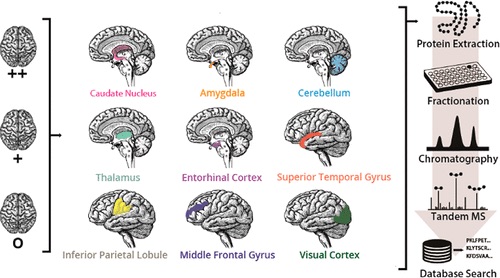Biologically relevant proteins in Alzheimer’s Disease
Proteomic analysis of cerebrospinal fluid (CSF) holds great promise in understanding the progression of neurodegenerative diseases, including Alzheimer’s disease (AD). As one of the primary reservoirs of neuronal biomolecules, CSF provides a window into the biochemical and cellular aspects of the neurological environment. Using mass spectrometry technologies, McKetney et. al. quantified 700 proteins across 10 pairs of age- and sex-matched participants. Using the paired structure, they identified a small group of biologically relevant proteins that show substantial changes in abundance between normal and AD participants. These findings suggest the utility of fractionating a single sample and using matching to increase proteomic depth in CSF.
Read the article: Pilot Proteomic Analysis of Cerebrospinal Fluid in Alzheimer’s Disease. Proteomics Clinical Applications.

